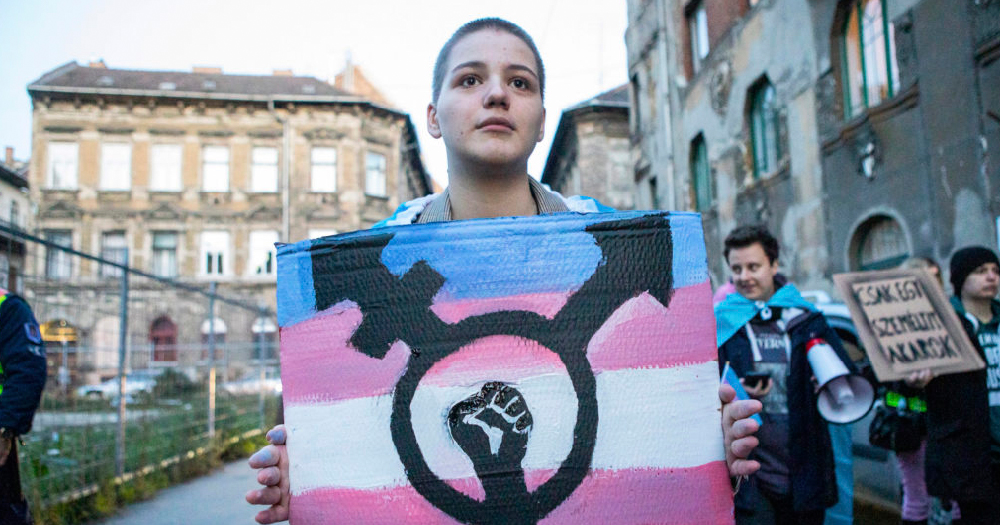The Hungarian government have proposed a draft bill outlawing legal gender recognition for trans and intersex people. The draft law aims to be brought into effect while prime minister, Viktor Orbán, has the power to rule by decree throughout the duration of the COVID-19 crisis.
On Tuesday, March 31, the Hungarian government submitted a proposed bill which strictly defines gender as “biological sex based on primary sex characteristics and chromosomes.”
Under the new law, people’s ‘sex at birth’ would be permanently recorded in the Hungarian civil registry. It will be impossible for a person to gain legal gender recognition in the future. Human rights campaigners and the EU condemned the Hungarian government’s proposed bill.
Amnesty International have called for the Hungarian government to revoke the prohibition of gender legal recognition for trans and intersex people.
As they note, “Amnesty International is concerned that the Hungarian government submitted a bill to Parliament that would gravely violate transgender and intersex people’s rights, while all efforts should focus on protecting and guaranteeing the right to health for everyone without discrimination, and taking urgent measures necessary to combat the COVID-19 pandemic.”
We're concerned that the Hungarian govt. has submitted a Bill to Parliament that would gravely violate trans & intersex people’s rights.
?️⚧️
Read our public statement ⬇️https://t.co/QRbaCKykez pic.twitter.com/4ir5Af3qXj— Amnesty LGBTI Network (@AmnestyLGBTI) April 7, 2020
In the press release, Amnesty further state,
“Transgender people should be able to obtain legal gender recognition through quick, accessible and transparent procedures and in accordance with their own perceptions of gender identity.
“States must ensure that transgender people can obtain documents reflecting their gender identity without being required to satisfy criteria that in themselves violate their human rights.”
The Council of Europe’s commissioner for human rights, Dunja Mijatović, advised Hungary’s government not to adopt the law as it goes against human rights standards. In a statement, she detailed,
“Transgender persons have the right to legal recognition of their gender based on self-determination. This is an essential step to ensure respect for their human rights in all areas of life. Legal gender recognition is a matter of human dignity.”
Blocking access to legal gender recognition for #trans people contravenes #humanrights standards & @ECHR_CEDH Court’s case-law. I call on #Hungary's Parliament not to adopt the amendments to the Registry Act in Bill T/9934 currently before them https://t.co/ttSaN3G4Um pic.twitter.com/HSvPuvv9Ag
— Commissioner for Human Rights (@CommissionerHR) April 2, 2020
Prior to the draft bill, the European Court of Human Rights was overseeing a case involving 23 trans Hungarians who were seeking legal recognition of their gender.
It gave the Hungarian government until June 4 to act, after which the European Court would rule on the case. However, the new draft bill sets to outright ban any change of gender and undo the legal protection of trans and intersex people.
A member of the European Parliament and co-president of Intergroup on LGBTI Rights, Marc Ange, said, “This attack on the trans community is outrageous and deliberate. This move does not only intentionally silence the trans community – it seeks to erase it and deny its existence.”
The announcement of the draft bill follows on from the Hungarian government passing a law allowing the prime minister, Viktor Orbán, to rule by decree throughout the duration of the COVID-19 crisis.
It also enforces jail time for intentionally spreading disinformation which will affect their pandemic response measures.
© 2020 GCN (Gay Community News). All rights reserved.
Support GCN
GCN is a free, vital resource for Ireland’s LGBTQ+ community since 1988.
GCN is a trading name of National LGBT Federation CLG, a registered charity - Charity Number: 20034580.
GCN relies on the generous support of the community and allies to sustain the crucial work that we do. Producing GCN is costly, and, in an industry which has been hugely impacted by rising costs, we need your support to help sustain and grow this vital resource.
Supporting GCN for as little as €1.99 per month will help us continue our work as Ireland’s free, independent LGBTQ+ media.
